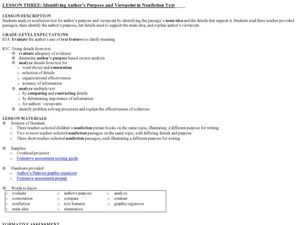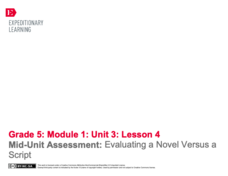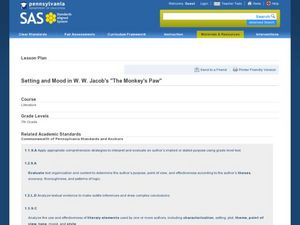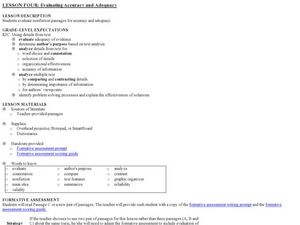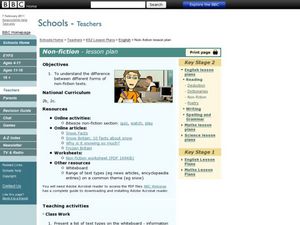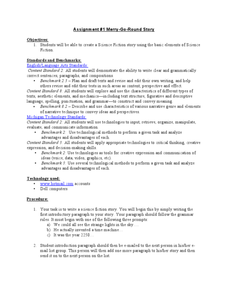Curated OER
Identify Text Features in Nonfiction
What does a non-fiction text look like? Examine the text features of non-fiction. Middle and high schoolers read non-fiction passages provided by their instructor and analyze the texts for word choice, details, and organization.
Ontario
Reading Informational Text
Learning to recognize the importance of the features of information text (i.e., titles, subtitles, endnotes, sidebars, etc.) is the focus of a reading activity designed for middle schoolers. Learners examine how these text features help...
Florida Center for Reading Research
Comprehension: Text Analysis, Fiction and Nonfiction Find
Scholars analyze fiction and nonfiction text and fill in a worksheet detailing the text's title, genre, and reason for its classification.
Curated OER
Satire in Fiction
Twelfth graders identify satire in various fictional texts. In this language arts lesson, 12th graders will learn to define satire, parody, and caricature. Students will identify different forms of satire in historical and modern-day...
Curated OER
Identifying Author’s Purpose and Viewpoint in Nonfiction Text
Why do people write books? Pupils discover how to identify the author's viewpoint. They read non-fiction passages their instructor selects (the plan has the class look at nonfiction children's picture books), and then identify the...
Curated OER
Creating a Science Fiction Story
As the culminating activity in a unit study of science fiction, young writers demonstrate their understanding of the genre by producing their own graphic novel. After deciding on the main elements of their story, individuals use a comic...
Curated OER
Comprehension Skills: Evaluate Using Fiction Stories and Aesop's Fables
Primary readers investigate several comprehension skills in the ten lessons of this unit. Forming opinions about stories, comparing stories to each other, using Venn Diagrams, and applying the ideas from a story to real life situations...
EngageNY
Mid-Unit Assessment: Evaluating a Novel Versus a Script
How are novels and scripts alike and different? As part of the mid-unit assessment, scholars complete a Venn diagram to compare two types of writing: a novel and a script. Next, they respond to short-answer questions, evaluating passages...
Curated OER
English Literature: An Overview
Relate literary works and authors to the major themes of English literature from the Anglo-Saxon period through the 20th century. Working in groups, high schoolers will evaluate period philosophy, religion, and politics that influenced...
Curated OER
The Importance Setting and Mood in Fiction
Seventh graders examine the setting in pieces of fiction. In this story analysis lesson, 7th graders investigate the setting in fictional stories and the importance it has. Students discover new vocabulary terms applying to storytelling.
Curated OER
Evaluating Accuracy and Adequacy
Evaluate non-fiction works with your English class. While practicing a variety of strategies detailed in the plan, readers compare and contrast the information in three non-fiction passages about the same topic. They then discuss the...
Curated OER
Wagons West!
Through learning about the Oregon Trail and Nebraska, learners evaluate the elements of historical fiction. Coming with a comprehensive bibliography, this lesson has your class learn about settlers traveling along the Oregon Trail,...
Curated OER
Effective Literary Analyses
Twelfth graders discuss a fictional text that they are given, they identify passages, which highlight the author's style, language naances and textual ambiguities. Pupils brainstorm possible topics for an analytical essay, they are...
Polk Bros Foundation
Common Core Constructed Response Organizer
Get your writers ready to compose a constructed response essay in response to either an informational or fictional text. Pupils note down the big idea they wish to address as well as up to nine examples from the text that they wish to...
Syracuse City School District
Reading Comprehension Unit Plan
A unit plan uses short texts to teach literary elements such as theme and characterization. Included are passages by authors such as Walter Dean Myers and Sandra Cisneros. Activities include quick writes, filling in graphic organizers,...
Curated OER
Non-Fiction Texts
Third graders examine different types of non-fiction texts. In this non fiction instructional activity, 3rd graders use different types of texts to gather information. Students work in groups to analyze the texts for author's purpose,...
Curated OER
Fictional Hereos
Learners are introduced to the definition of a hero. As a class, they compare and contrast the difference between non-fictional and fictional hereos they have read about. They read a story, create a story map of one of the heroes and...
Curated OER
Comparing and Contrasting Fiction and Nonfiction Using Graphic Organizers
Students compare and contrast fiction and non-fiction selections. In this writing skills lesson, students use different forms of graphic organizers to compare "The Three Little Pigs," to Wiesel's Night.
Curated OER
Analyzing Features of Consumer Text
Young scholars evaluate consumer information. In this written communication instructional activity, students read nutrition facts from different foods and determine the foods that have the most healthful benefits.
Curated OER
Assignment # 1: Merry-Go-Round Story
Class members use e-mail and the merry-go-round story format to create a science fiction story. Each writer begins by selecting one of three prompts, crafting the introductory paragraph and sending the paragraph to the next person on the...
Curated OER
Ready Set Go Woah: KWL for Ender's Game
Readers of Orson Scott Card's award-winning science fiction novel, Ender's Game use the provided KWL worksheet to list what they already know about war, what they think they will learn in reading the book, the new information they did...
Curated OER
Applying SQ3R to Texts
After a review of the SQ3R strategy, readers use the provided prompts to respond to a text. The value of this worksheet is in the additional questions that move the learner into higher levels of reasoning.
Curated OER
Understanding Rhetoric and Evaluating Bias in Text
Students can learn about bias in text and the rhetorical principles proposed by Aristotle.
Curated OER
Rudyard Kipling's "Rikki-Tikki-Tavi": Mixing Fact and Fiction
"Rikki-Tikki-Tavi," from The Jungle Book, offers young readers a chance to examine how Rudyard Kipling uses setting and personification to bring to life the brave mongoose who battles cobras to protect his family. Class members explore...






